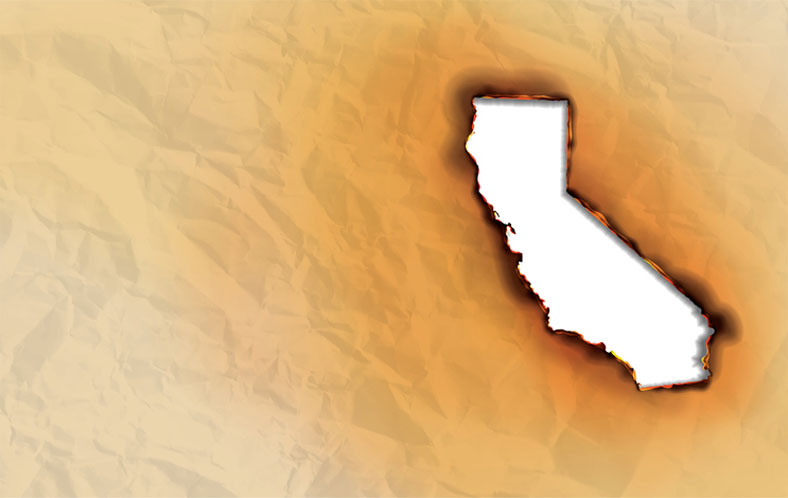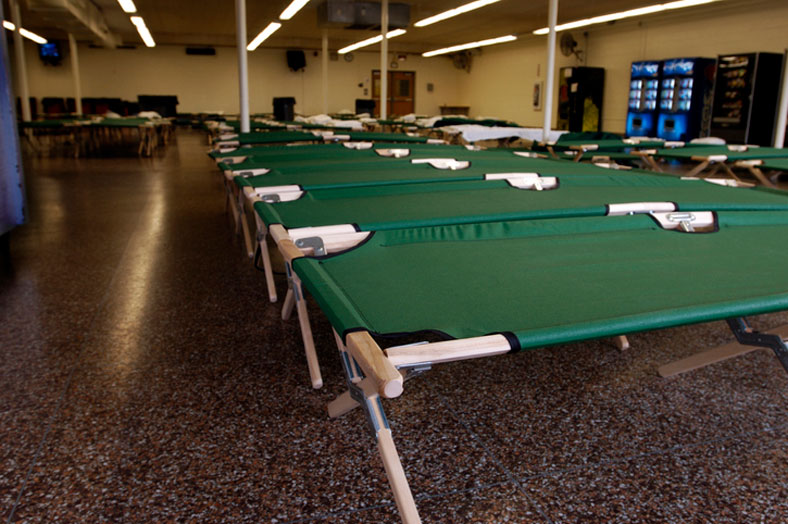Written by Sam Medley

National debates about climate change can be infuriating. Hard data about dangerous weather patterns, crumbling coastlines, and impending resource scarcity is often met with a big, “So what?” But Californians don’t have the luxury of dismissing these issues. They see the fallout from environmental neglect happening in real time — and they demand change.
In fact, a 2022 survey conducted by the Public Policy Institute of California found that 80% of the state’s residents say climate change is a serious threat to their quality of life and future, citing wildfires, droughts, and rising energy costs as their main concerns.
Featured Programs:Sponsored School(s)
But if climate change is already affecting the average Californian, what does that say about the quality of life for people who are already struggling? Families in poor neighborhoods polluted by decades of industrial waste? The homeless walking the streets? The chronically ill who can barely afford medication, much less their monthly utility bills?
All of these people deserve justice. To get it, they need a combination of short-term aid, long-term solutions, and endless amounts of advocacy. Environmental social workers are equipped to provide just that.
What Is Environmental Social Work?
Environmental social work, also called eco-social work, is focused on two things: protecting people by protecting the planet and helping people who face immediate risks from things like pollution, climate change, and extreme weather.
In the name of these lofty goals, environmental social workers carry out a few essential tasks:
- Assessing individual and community needs. Environmental issues impact each person and community differently. By analyzing current conditions and historical trends, social workers can determine what services need to be prioritized.
- Providing social services to individuals and communities. People impacted by climate change and pollution often need help accessing healthcare resources, housing, and more. Environmental social workers can provide these services themselves or connect people to other social service programs. They can also coordinate crisis intervention efforts following natural disasters.
- Promoting community education and engagement. Social workers can work with local organizations to empower traditionally underserved groups to have a voice in laws that directly affect the environmental health of their communities.
- Advocating for systemic environmental justice. Providing direct services only goes so far. Many climate justice social workers get involved in the local, state, and federal policymaking processes that determine future regulations.
- Conducting research. Data is key to crafting effective climate policies. Research-oriented social workers can conduct surveys, analyze government data, and present it to lawmakers and other stakeholders to foster change.
- Promoting and overseeing sustainable practices. Almost any environmental initiative requires a long-term vision. Social workers can help their organizations and communities establish practical, sustainable, and equitable policies.
As diverse as these duties are, one thing ties them together: the need for collaboration. Environmental social workers must motivate professionals, lawmakers, and everyday people to become stewards for the world they live in.
Environmental Social Work Job Opportunities and Titles
Many environmentally-conscious social workers simply work under the title of social worker. Even specialists like mental health social workers and school social workers do their part to support people experiencing the fallout from climate change and natural disasters.
But if you’re looking to focus your passion for environmental equity into a career, here are a few roles you may want to consider:
- Environmental Justice Advocate.
- Environmental Health Advocate.
- Community Organizer.
- Public Health Specialist.
- Environmental Policy Analyst or Environmental, Social, and Governance (ESG) Analyst.
- Crisis Response Coordinator.
- Crisis Intervention Specialist.
- Sustainability Coordinator.
- Disaster Preparedness and Resilience Specialist.
Advocate and organizer roles are typically frontline jobs that early-career social workers are eligible for. Analyst, coordinator, and specialist roles may require more experience, education, and/or certification in personnel management or data management.
Types of Environmental Social Work Agencies
Government Social Service Agencies
As wealth gaps widen and industry expands, environmental justice is becoming more entwined in social justice. In fact, the California Office of Environmental Health says the state’s poorest residents are more likely to be affected by pollution than wealthier residents, cementing the link between environmental justice and social work.
Because of that, many government social service agencies are integrating environmental wellness services into their programs. This includes conducting everything from public health education campaigns to health screenings and pollution cleanup.
Government Disaster and Emergency Response Agencies
As of September 2023, the California State Board of Equalization reports that there have been 163 governor-proclaimed disasters since 1991. These floods, fires, earthquakes, and chemical leaks displaced thousands. For some, these chaotic moments were their last. Their loved ones were left dealing with not just physical loss and harm, but severe psychological trauma.

Emergency and disaster response agencies employ social workers (or work with social service agencies) to assess survivors and connect them to resources like temporary housing and medical care. Social workers can also administer counseling to survivors as they process grief. This robust continuum of care, referred to as crisis intervention social work, is vital to helping people regain a sense of safety.
Public Health Departments
Public health departments are responsible for addressing any health issues that affect large groups of people. This includes ecological problems like waste disposal, climate change, emergency preparedness, and droughts. They sometimes employ social service professionals to run awareness campaigns and garner support for new environmental protection laws.
Healthcare Providers
The short-term effects of pollution are bad enough, but when left untreated, they can turn into deadly chronic illnesses that affect communities for generations. But unfortunately, not everyone can afford treatment.

Healthcare social workers employed by hospitals and community clinics help people find affordable healthcare, organize community health screenings, and advocate for their clients’ rights when discrimination prevents specific groups from seeking treatment in the first place.
Community-based Nonprofit Organizations
When it comes to crafting safe, equitable environmental policies, government organizations don’t always follow through. Nonprofits and community-based organizations play an important role in holding them accountable.
Through community organization and awareness campaigns, community-based organizations ensure that specific communities can participate in the legislative process. Many community-based organizations also often conduct their own research about environmental dangers and provide services directly to the neighborhoods they serve.
Environmental Social Work Organizations in California
Ecologically-focused social work hasn’t caught on in many places, but fortunately, California is a national hub for it.
If you’re considering a career in environmental stewardship, here are a few potential employers in California to investigate:
- The Disaster Services Branch (DSB) of the California Department of Social Services. The DSB is the government agency responsible for coordinating food, shelter, and other services for Californians affected by natural disasters. They also partner with and provide training to county social service agencies and community-based organizations.
- The California Environmental Protection Agency (CalEPA). CalEPA designs and enforces the state’s environmental protection laws. Through their Environmental Justice Program, they research community-specific issues, give grants to local environmental justice organizations, and advocate for the rights of people unfairly shouldering the weight of ecological injustices.
- The California Environmental Justice Alliance. Made up of community organizations across the state, the Environmental Justice Alliance advocates for the environmental rights of California’s people of color and its impoverished communities. Though they have a wide goal, some of their more specific initiatives focus on energy equity and creating protected green zones in underserved neighborhoods
- The Center for Ecoliteracy. By helping schools provide fresh meals, sponsoring sustainability education initiatives, and advocating for systemic reform, the Center for Ecoliteracy prepares California youth to face the realities of climate change today and in the future. In addition to these grassroots efforts, the Center also provides sustainability consulting services, hosts professional seminars, and publishes its own research.
These organizations are only a sampling of the environmental justice career opportunities available in California. To continue your own job search, you may want to explore the many organizations these agencies partner with.
How To Become an Environmental Social Worker in California
If you’d like to become an environmental social worker, your journey will likely be similar to that of your peers in more traditional specialties like child welfare. However, because eco-social work is a relatively new frontier, there are a number of ways you can tailor your experience to fit your goals.
Many professionals start by earning a bachelor’s in social work (BSW). In a BSW program, you’ll learn about basic social work practices like case management and behavioral intervention. You’ll also be required to complete a hands-on fieldwork experience. By working closely with a faculty advisor, you may even secure a placement at the environmentally-focused agency of your choice. Additionally, you may want to minor or take classes in subjects like ecology, environmental health, or environmental law.

It’s important to note, though, that BSWs are typically seen as entry-level degrees. To broaden your career prospects, consider earning a Master’s of Social Work (MSW). While MSW programs teach advanced social work principles, most programs have two- and three-year options for students that have no prior social work experience. If you already have a BSW, you may be able to earn your MSW in as little as one year.
But most importantly, MSW programs allow students to specialize in a specific area of social work — an option most BSW programs don’t have. Unfortunately, environmental specializations are rare. If you can’t find an MSW program in California that offers one, you may want to consider specializing in:
- Advanced Generalist Practice. This specialization prepares students to craft effective programs, supervise teams, conduct research, and carry out other high-level duties in any number of settings.
- Clinical Practice. Clinical programs put students on the path to become Licensed Clinical Social Workers (LCSWs) in California. LCSWs are state-licensed mental health practitioners and some of the most dynamic frontline professionals. Additionally, the evidence-based approach of clinical social work may prove useful to future environmental researchers and policymakers.
- Community Development and Social Systems. If you’re considering a role at a community-based environmental advocacy organization, this specialization can enable you to lead any kind of empowerment, outreach, or educational campaign.
- Healthcare. Because health issues and issues with the healthcare system itself are often central to environmental inequity, being an expert in this domain could open unique doors in environmental welfare.
- Macro Social Work. Macro social work professionals dedicate their talents to ushering in large-scale reform. These changes are integral to long-lasting ecological reform.
Despite environmental specializations being uncommon, more programs are offering courses about the relationship between social and environmental justice. And in 2021, the National Association of Social Workers (NASW) formally made environmental justice one of their top priorities. So even though schools may be in the early stages of including it in their curriculum, environmental justice as social work practice is quickly becoming an important part of the field.
Environmental Social Work Salaries in California
According to the Bureau of Labor Statistics (BLS), social workers in California make an average salary between $66,340 and $88,380 depending on specialty. Environmental social workers may fall into the BLS’s all other social workers category. This group makes an average of $69,530 in California. However, not all ecological social service professionals work in social worker roles.
Those focused on public education efforts may be classified as health education specialists in BLS data. Their average annual earnings are $74,700. Some social workers transition into research roles. The BLS reports that environmental scientists and specialists make an average wage of $101,190 in California.
These averages don’t represent what entry-level or extremely experienced professionals make. For a clearer idea of your salary potential, refer to the following table of BLS income data for various eco-social careers in California. But remember — these numbers can vary between employers, location, and other factors. For example, some of the most highly-paid social workers are those with MSWs and those who become LCSWs.
|
Social Work Specialty |
10% |
25% |
50% (Median) |
75% |
90% |
|
Child, Family, and School social Workers |
$39,700 |
$47,950 |
$62,610 |
$79,530 |
$103,180 |
|
Healthcare Social Workers |
$50,870 |
$63,760 |
$80,790 |
$105,050 |
$133,100 |
|
Mental Health and Substance Abuse Social Workers |
$44,680 |
$54,760 |
$79,530 |
$104,000 |
$126,120 |
|
Social Workers (All Other) |
$42,750 |
$49,120 |
$62,200 |
$86,010 |
$106,760 |
|
Health Education Specialists |
$42,370 |
$46,830 |
$65,160 |
$100,040 |
$120,180 |
|
Environmental Scientists and Specialists, Including Health |
$59,780 |
$76,330 |
$95,100 |
$122,410 |
$149,260 |
Table data taken from 2022 BLS reports for California.
2022 US Bureau of Labor Statistics job market trends and salary figures for social workers (all other), health education specialists, and environmental scientists and specialists are based on national data, not school-specific information. Conditions in your area may vary. Data accessed August 2023.
Discover more about other social work specializations in California.





